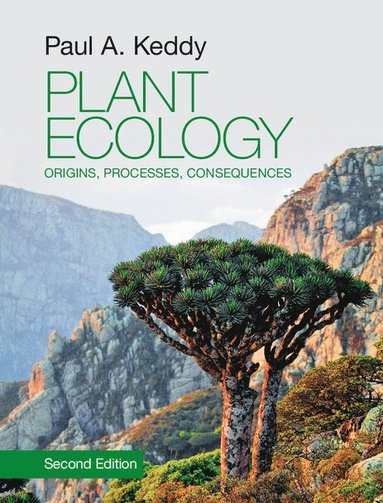
- Format
- Inbunden (Hardback)
- Språk
- Engelska
- Antal sidor
- 624
- Utgivningsdatum
- 2017-04-17
- Upplaga
- 2
- Förlag
- Cambridge University Press
- Illustratör/Fotograf
- 187 b, w illus 192 colour illus 64 tables 89 exercises
- Illustrationer
- 187 b/w illus. 192 colour illus. 64 tables 89 exercises
- Dimensioner
- 247 x 190 x 31 mm
- Vikt
- Antal komponenter
- 1
- Komponenter
- ,
- ISBN
- 9781107114234
- 1660 g
Plant Ecology
Origins, Processes, Consequences
- Skickas från oss inom 7-10 vardagar.
- Fri frakt över 249 kr för privatkunder i Sverige.
Passar bra ihop
De som köpt den här boken har ofta också köpt The Anxious Generation av Jonathan Haidt (inbunden).
Köp båda 2 för 1087 krKundrecensioner
Fler böcker av Paul A Keddy
-
Wetland Ecology
Paul A Keddy
-
A Framework for Community Ecology
Paul A Keddy
-
World's Largest Wetlands
Lauchlan H Fraser, Paul A Keddy
Recensioner i media
'Keddy's Plant Ecology is a refreshing synthesis of the core concepts of the discipline. It is a remarkably readable book that is brimming with vivid stories about the central role of plants in the biosphere. This milestone in the canon of ecological literature pays homage to the previous generations of plant ecologists that built the field as we know it. The organisation is unconventional yet intuitive, the prose is animated yet enlightening, and the revised figures are both colourful and instructive. I highly recommend this book to anyone who wants to acquire a broad understanding of plant ecology.' Daniel Laughlin, The University of Waikato, New Zealand
'In the early pages of this distinctive and engaging book Paul Keddy explains the underrated foundational role of plants in the origin of life on Earth. This is followed in masterfully discerning style over several chapters by arguments and evidence in which he champions the plant ecologists who are advancing specific sets of plant functional traits as the basis of vegetation patterns and as key factors in ecosystem structure and dynamics and responses to climate and management. Finally in conclusion, Keddy identifies and reproaches Man as the remorseless destroyer of our plant heritage and casts a critical eye at current efforts at conservation and restoration.' Philip Grime, Buxton Climate Change Impacts Lab, University of Sheffield
'The new volume by Paul A. Keddy ... provides a comprehensive overview of major concepts and hypotheses in ecology in general and plant ecology in particular. Because of the presentation of the basic concepts, this textbook could easily function as a teaching tool for general ecology, using plants as a focus group, with leaving only some subfields, such as behavioral ecology, untouched. As a volume for a plant ecology class, it provides everything that biology or ecology students can wish for, most importantly a very solid conceptual framework for the organization of knowledge on the subject.' Andr Kessler, The Quarterly Review of Biology
Övrig information
Paul A. Keddy has taught plant ecology for more than thirty years. He is often a conference keynote speaker, and delights in bringing science alive for his audience. Dr Keddy's research explores environmental factors that control plant communities and their manipulation to maintain and restore biodiversity. His awards include a National Wetlands Award for Science Research, the Lawson Medal and Gleason Prize for Competition, and his first edition of Wetland Ecology (Cambridge, 2000) won the Society of Wetland Scientists' Merit Award. He has also advised organizations including World Wildlife Fund, Earthjustice, and The Nature Conservancy.
Innehållsförteckning
Preface; 1. Plants create the biosphere; 2. The search for global patterns; 3. Resources; 4. Competition; 5. Disturbance; 6. Herbivores; 7. Positive interactions; 8. Time; 9. Populations; 10. Stress; 11. Gradients and plant communities; 12. Diversity; 13. Conservation and management; Questions for review; References; Glossary; Index.


